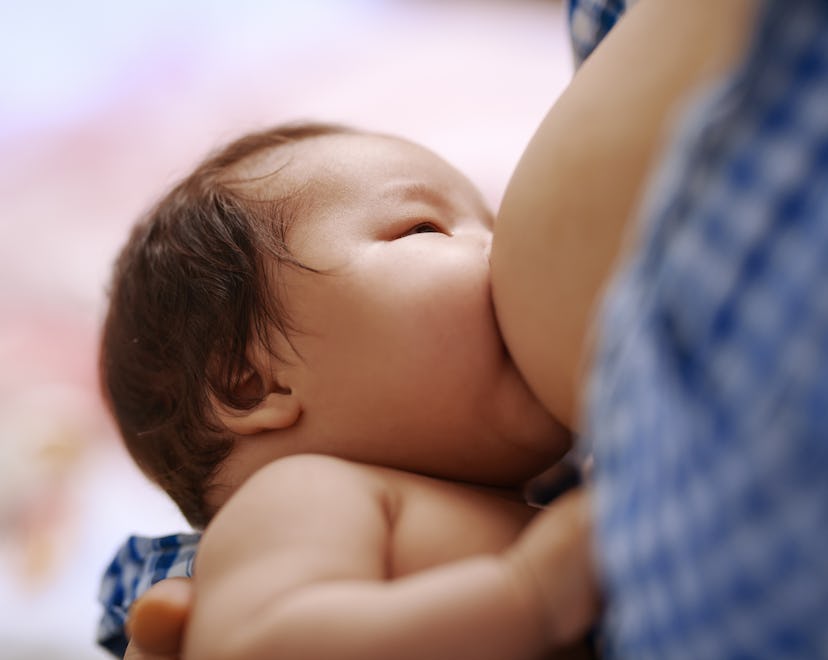Breastfeeding

Can You Drink Coffee While Breastfeeding? Experts Explain
Here's everything you need to know about caffeine and breastfeeding.
For most new parents — and parents in general — coffee is a lifesaver. It’s warm, comforting, and gives you that little pick-me-up we all need to get through life as a parent of a newborn. And during those first few weeks, months of or even years of breastfeeding, that precious sleep is even harder to get, so caffeine feels like an absolute necessity. We were told to limit our caffeine intake while pregnant, what about after the baby is born? How much caffeine is OK if you’re breastfeeding? And, in the summer months, can you have cold brew coffee while breastfeeding? After all, it usually has even more caffeine than drip coffee. These are absolutely essential questions for any new parent.
Can you drink coffee while breastfeeding?
Generally speaking, it is safe to consume caffeine while breastfeeding according to La Leche League. As far as how many cups of hot drip coffee is OK to drink while breastfeeding, most women can safely have one or two eight-ounce cups of coffee per day, says Leigh Anne O'Connor, an international board-certified lactation consultant in New York City.
But, if your preferred method of caffeine intake is cold brew while breastfeeding, what are the rules? Although it varies a lot depending on how you — or your favorite barista — brews the cold brew, cold brew coffee does generally contain more caffeine than regular drip coffee.
Can you have cold brew while breastfeeding?
While the experts do say it is safe to enjoy a cold brew if you’re breastfeeding, it’s best if you know roughly how many milligrams of caffeine are in that cold brew. That way, you’ll know if you’re within the recommended guidelines about how many milligrams of caffeine can you safely have per day while breastfeeding.
It’s safe to consume around 200 to 300 milligrams of coffee per day, says Kristen Howorko, an international board-certified lactation consultant. “Depending on your drink of choice, you may be able to have one-to-three cups of coffee or cold brew a day. An average eight ounce cup of coffee has 100 to 175 milligrams of caffeine,” she says.
How long should I wait to breastfeed after drinking coffee?
For those of us who need to drink that caffeine during the morning feed, you may be wondering how long until the caffeine hits your bloodstream, and then your breastmilk. Most food or drink is processed through the body, says Howorko says. Drinking cold brew while breastfeeding is perfectly safe for most people, and it’s unlikely that much caffeine is passed to the baby. To be safe, you may want to wait until right after a feed so that you have a few hours to process the caffeine before the next feeding.
Should you ‘pump and dump’ if you’ve had too much coffee?
Thankfully, most of the time infants aren’t affected by your caffeine intake, says Howorko. That is, unless you have more than 10 cups of coffee in a day, which isn’t recommended for anyone — nursing or not. As far as if you should pump and dump if you’ve had too much caffeine, Howorko answers with an emphatic no.
“Breast milk is precious,” she says. “If you feel as though you have had too much caffeine, and in the past you've noticed that your baby has shown signs of being affected by caffeine, you can pump — but not dump. You can then take that pumped milk and combine it with breast milk stored in the fridge or freezer to dilute any traces of caffeine that may be affecting your infant.”
While it is perfectly safe to drink caffeine while breastfeeding, as always, keep an eye on your baby to see if they’re showing any signs of fussiness or trouble sleeping. If they are, just cut back on the caffeine. Everything in moderation.
Sources Interviewed:
Kristen Howorko, an international board-certified lactation consultant with SimpliFed
Leigh Anne O'Connor, international board-certified lactation consultant.